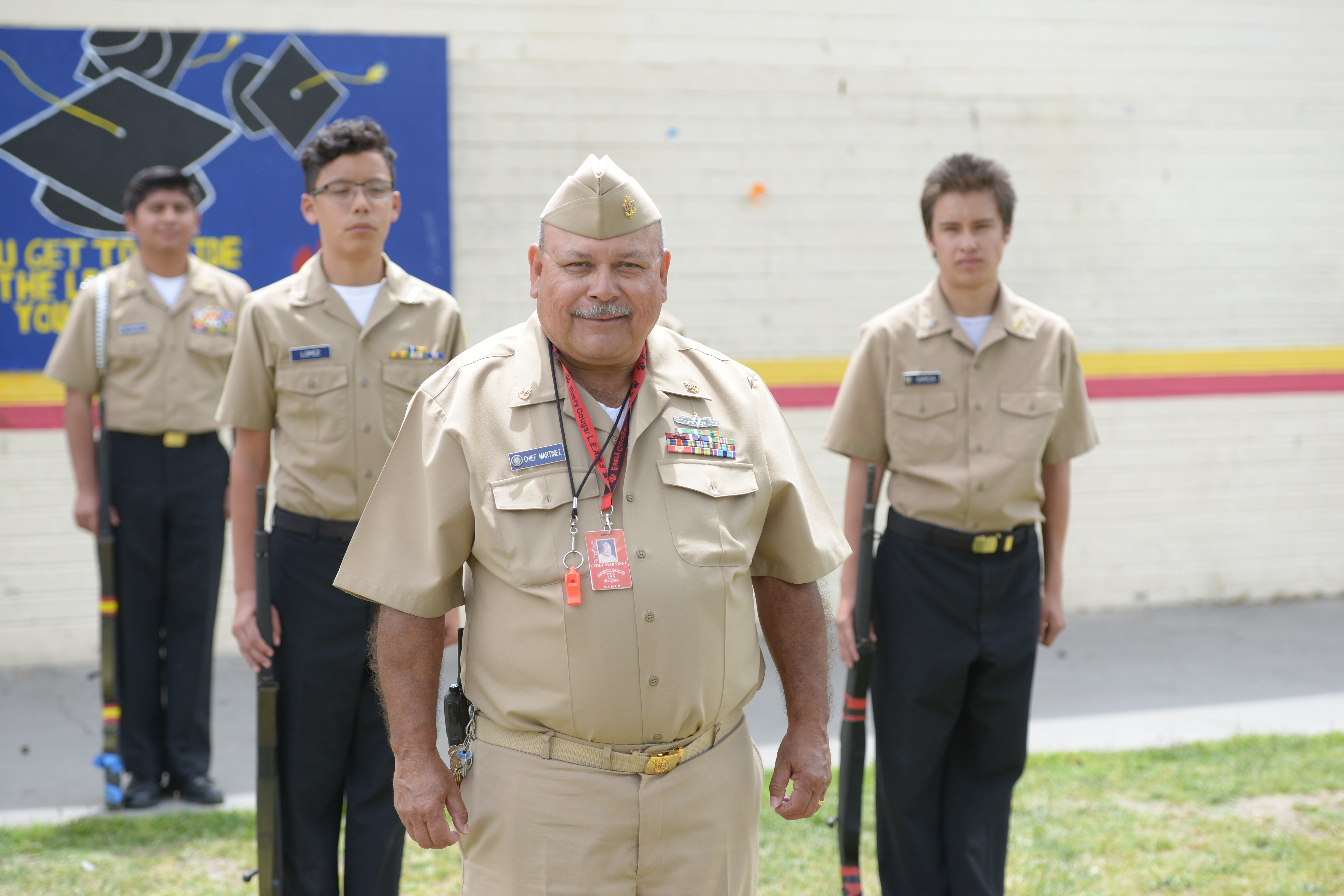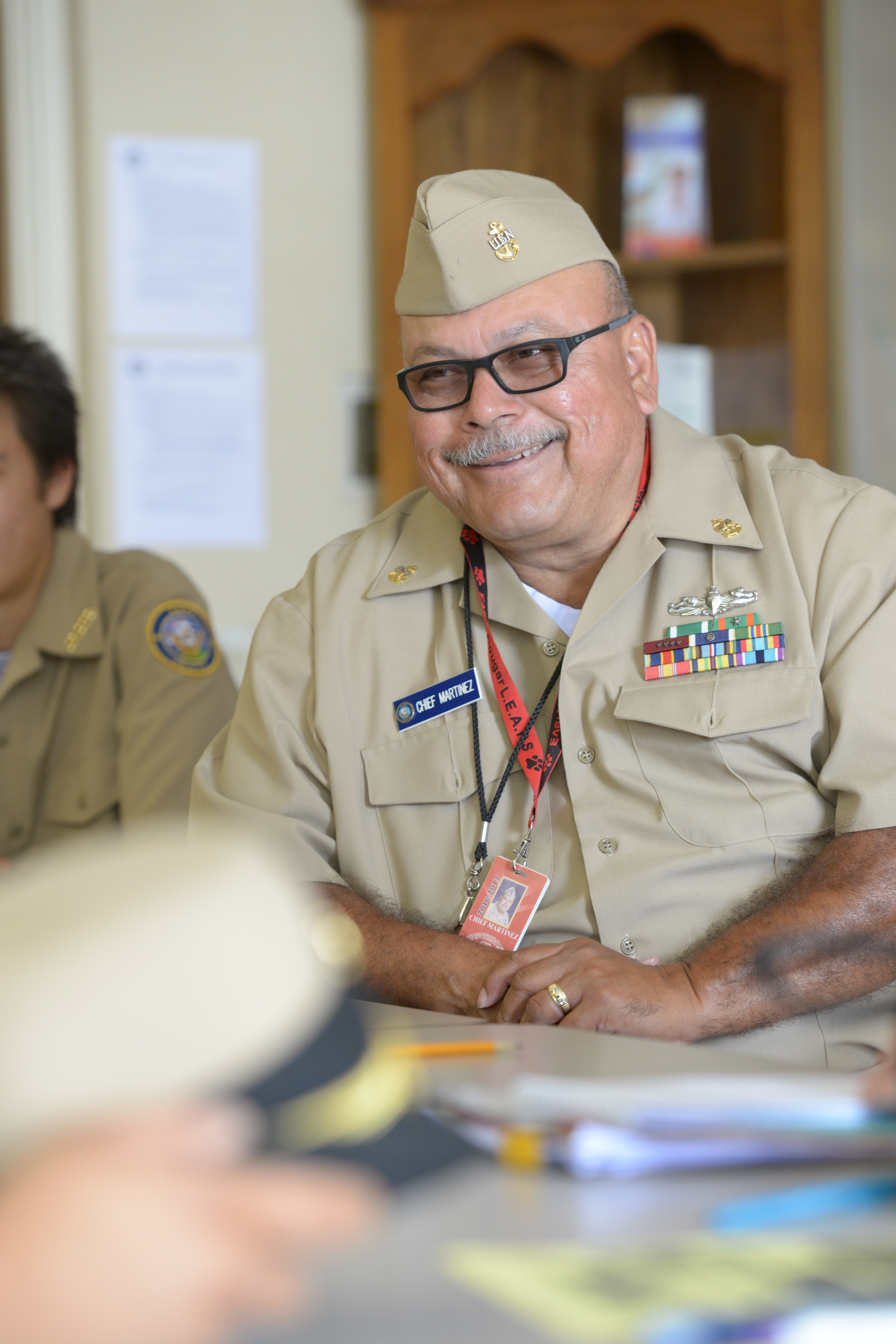When Pedro Martinez gives students their marching orders, the boys and girls fall into formation and march across the campus of Hawthorne High School. Their uniforms are impeccably clean and pressed, their expressions are solemn. When they skillfully toss and twirl their wooden rifles in the air, they catch them — in most cases without missing a beat. Martinez stands at the sidelines barking orders, wearing a Navy uniform and a proud expression.

Martinez tells his students, “You must have pride in your country, state, community, school, and yourself.”
Martinez, 62, has been teaching Navy Junior ROTC (Reserve Officers’ Training Corps) classes for 14 years. He earned a special subject credential to teach ROTC from CSU Long Beach. The former Navy man and UFW organizer is also active with his own union. He’s vice president of the Centinela Valley Secondary Teachers Association and serves on CTA’s State Council.
His students learn much more than military skills. They make underwater robots that can move objects through an obstacle course and enter them in competitions. They learn map, compass and shipbuilding skills. They built a miniature replica of the aircraft carrier USS Theodore Roosevelt and entered it in a Memorial Day parade.
Their extracurricular activites include everything from entering ROTC competitions to studying cyber security, engaging in pellet gun target practice, and performing at memorial services and veterans’ events.
Sophomore Kevin Villalobos says some students enroll in ROTC because they think it will be an easy elective, but then find out it’s anything but.
“This program is not easy. We work hard, and we have a strong work ethic. But like many things in life, it’s worth it.”
Javier Moreno, a junior, says the course helped him overcome shyness and develop confidence. “I speak out in my other classes and raise my hand now,” he says.
The Navy pays for course materials and computers, and 50 percent of Martinez’s salary.
“I want to instill pride in my students,” says Martinez. “It’s definitely part of my curriculum to explain that you must have pride in your country, state, community, school and yourself.”
He is aware that some people object to ROTC classes and that critics believe their purpose is to recruit students into the military, which could result in death or injuries. But the military, he points out, can be a way out of poverty and offers money for college and training in specific areas such as electronics, engineering and cyber intelligence, which may lead to successful careers.
“Our ROTC classes are not there to recruit students,” he says. “We are only there to train them in Navy curriculum. Very few of my students actually join the military.”
Few may enlist, but most learn discipline that keeps them in line. To stay in his class, they must keep their grades up, stay out of trouble and be respectful.
“My approach is that if you want respect, you have to learn how to give respect. And my students know that if they want to be in my class, they have to perform well in all their classes.”
The teacher they call “Chief” has clearly earned their admiration.
“I’m learning respect,” says Izaak Lopez, a sophomore. “I’ve learned that I have to be presentable. I’ve learned maturity. I’ve learned commitment. I’ve become responsible.”
Jessie Vales, a sophomore, says the ROTC class helps him do better in his other classes. “I’ve straightened up a lot,” he explains.
Briyit Sandoval graduated last year and is considering enlisting in the U.S. Marines. “Because I am interested in the military, I thought ‘why not take a class and see if I enjoy it?’ I found that I did, and I looked forward to this class every day. It taught me honor, courage and commitment.”
Students such as Sandoval make their teacher proud.
A Veteran Organizer

Pedro Martinez served in the U.S. Navy for more than 20 years, enlisting when he was 25 because he wanted to see the world. He has visited Japan, the Philippines, South Korea, Singapore, Iran, Bahrain, Croatia and Austria. He did not engage in combat, but he had a dangerous job working on his ship’s boilers. At times crew members worried they might be targets — especially after the United States invaded Iraq in 2003.
Before all that, Martinez was active in the United Farm Workers’ efforts to unionize. He grew up in Delano, the heart of the movement, and picked crops. One day he saw the foreman removing pro-UFW fliers from car windshields and throwing them into the trash. Martinez took them out of the trash and placed them back on the cars, telling the foreman he could do what he wanted on his lunch hour. He was cussed out and fired. So he went to work for Cesar Chevez.
“I used to go to the fields during grape season and deliver union materials,” he says of that era. “I would go to farmworkers’ houses and talk to them about how the union would benefit them and why they needed a contract. I did a lot of campaigning.
“It was a very emotional time and a part of history.”
The Discussion 0 comments Post a Comment